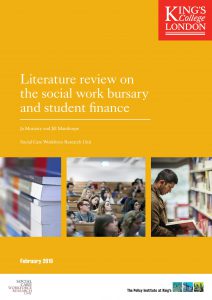Jo Moriarty is Senior Research Fellow and Deputy Director at the Social Care Workforce Research Unit. The report on the social work bursary, published today, is available free to download. (604 words)
 There has been a large rise in the volume of social work research undertaken in the UK over the past 20 years but one topic remains stubbornly under researched: student funding in social work education. This is all the more surprising when we remember the attention given to tuition fees in the last three general elections.
There has been a large rise in the volume of social work research undertaken in the UK over the past 20 years but one topic remains stubbornly under researched: student funding in social work education. This is all the more surprising when we remember the attention given to tuition fees in the last three general elections.
In June 2017, the Department of Health and Social Care Policy Research Programme commissioned the Social Care Workforce Research Unit to undertake a short review of the social work bursary.
We had already done a similar piece of work so we had not expected to uncover a large research evidence base. However, it still seems surprising that there is so little research on social work students finances given that many social work students are drawn to social work after being in care or experiencing discrimination or poverty.
Research findings are just one influence on the policy making process. This may be even more nebulous when the evidence base is thin. Nevertheless, we thought there were eight possible policy options based on the material we identified:
- Prior to the introduction of the bursary, there was a steep rise in international recruitment in the late 1990s because of declines in the numbers of social work students. The social work bursary should be maintained for at least the period leading up to Brexit to maintain a stable supply of student numbers and avoid the risk of over reliance on international recruitment to fill vacant social work posts.
- The Centre for Workforce Intelligence (2016) predicted that demand for social workers would have increased by a third between 2015-2035. Cross departmental discussions between the Department of Health and Social Care and the Department for Education could be held to update estimates about the number of social workers needed in adult and children’s services, while recognising that unforeseen events can always affect the best laid plans. (A good example of this is the Cheshire West judgment which increased the number of Deprivation of Liberty Safeguards.)
- The key to cost-effective social work education is retention because it means that organisations are not playing ‘catch up’ to match the number of newly qualified social workers with those who are leaving before the age of retirement. There is a role for discussions with the new regulator Social Work England about its possible role in collecting data on retention rates among registrants that can be used in research and workforce planning.
- There is some evidence that the social work bursary has helped attract a more diverse range of social work students. An impact assessment would help answer questions about the contribution the bursary makes to maintaining diversity within the profession.
- Future announcements about the bursary need to be made in time to allow potential applicants sufficient time to make alternative arrangements – for instance to apply to study part time.
- Currently there is considerable diversity in qualifying routes to become a social worker. What would be the consequences if monopoly suppliers developed in social work education? A risk assessment could be undertaken to consider what might happen if this occurred.
- It is estimated that two-thirds of graduates will never pay off their student loans. There is potential to examine the extent of non-repayment of student loan debt among moderate earners such as social workers, nurses and teachers and consider whether there are other options for student finance.
- We know very little about the extent to which social work students access student services and other sources of financial information, such as the Money Advice Service, for financial advice. Are steps needed to help students make the most of these services?
Jo Moriarty is Senior Research Fellow and Deputy Director at the Social Care Workforce Research Unit. The report, which she co-authored with Jill Manthorpe, is available for download.